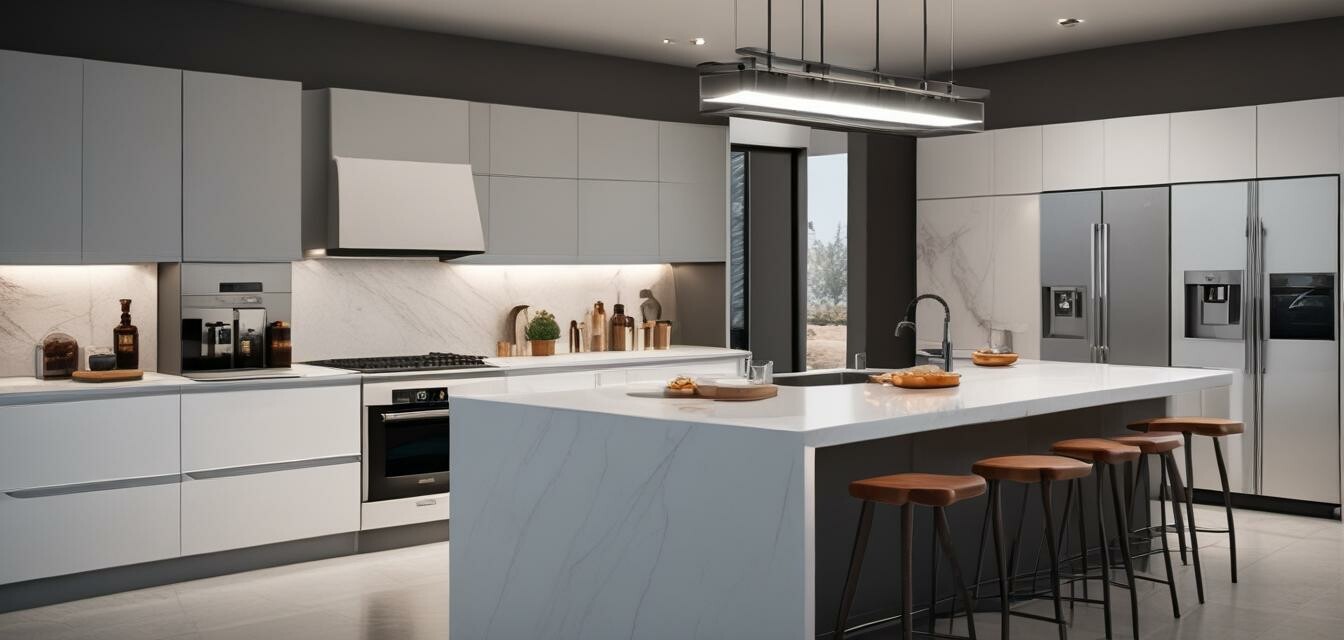
How Smart Home Integration Is Changing Kitchens
Key Takeaways
- Smart home technology is enhancing kitchen efficiency and functionality.
- Integration of various devices allows seamless user experiences.
- Eco-friendly innovations are becoming increasingly popular.
- Smart kitchens can improve safety and convenience in cooking.
The modern kitchen is no longer just a place to prepare meals; it's rapidly transforming into a smart hub, integrating advanced technologies that enhance design and functionality. With the rise of smart home integration, kitchens today are equipped with intelligent devices that improve efficiency, safety, and convenience. Let's delve deeper into how these innovations are reshaping our cooking spaces.
The role of smart home technology in the kitchen
Smart home technology plays a crucial role in modern kitchens. These innovations range from automated cooking appliances to smart kitchen gadgets that make meal preparation quicker and easier. Below are some of the key components of smart kitchen technology:
- Smart ovens: Enable remote monitoring and control via smartphones.
- Touchless faucets: Use motion sensors for hands-free operation.
- Intelligent cooktops: Adjust heat levels automatically based on the pan used.
- Bluetooth-enabled appliances: Allow for connectivity with various devices.
Benefits of smart kitchen integration
Integrating smart technology into kitchens provides various benefits, enhancing the cooking experience dramatically. Here’s a detailed overview:
| Benefit | Description |
|---|---|
| Increased efficiency | Smart devices can reduce cooking time and improve meal prep consistency. |
| Convenience | Control appliances from your smartphone, even remotely. |
| Enhanced safety | Smart technologies can help prevent kitchen accidents and fires. |
| Energy savings | Many smart appliances are designed to be energy efficient, reducing utility bills. |
How smart home integration is shaping kitchen designs
With the rise of smart home technology, kitchen designs are changing significantly to accommodate these new devices. Here are some popular trends:
- Open-concept layouts: Allow for better integration of smart devices.
- Minimalistic designs: Focus on clean lines and hidden technology.
- Multi-functional spaces: Spaces that can easily adapt from cooking to dining.
- Use of high-quality materials: To support advanced appliances and durability.
Emerging trends in smart kitchen technology
The world of kitchen technology is constantly evolving. Here are some of the latest trends that are set to transform your cooking experience:
- AI integration: Smart appliances that learn from user behaviors to customize cooking processes.
- Voice-activated controls: Allow users to operate appliances hands-free.
- Food preservation technology: Refrigerators that manage food inventory and suggest recipes based on available ingredients.
- Sustainability: Eco-friendly practices and appliances that help reduce waste and environmental impact.
Smart kitchens and the future of cooking
The integration of smart home technology into kitchens is not just a trend, but a glimpse into the future of cooking. As these technologies continue to advance, we are likely to see:
- Further integration of IoT devices that communicate with each other.
- Enhanced user-centric designs focused on ease of use.
- Increased availability of custom solutions tailored for individual needs.
- More education and awareness about the benefits of smart kitchens.
The impact of smart appliances on kitchen functionality
Smart appliances fundamentally change how we think about kitchen functionality. They not only make cooking easier but also enhance the overall kitchen experience. Here’s a closer look at their impact:
| Smart Appliance | Functionality |
|---|---|
| Smart refrigerators | Track food inventory, suggest recipes, and include touchscreens for convenience. |
| Smart ovens | Allow remote preheating and offer precise cooking settings for different recipes. |
| Touchless faucets | Facilitate hands-free operations to maintain cleanliness. |
| Smart cooktops | Auto-detect the size and material of pans for optimal heating. |
Pros
- Increased efficiency and time savings.
- Enhanced safety with automatic shutoff features.
- Convenient access to recipes and cooking guidance.
- Customization to suit individual cooking preferences.
Cons
- Higher initial investment compared to traditional appliances.
- Potential for technical issues and malfunctions.
- Compatibility issues between different brands and devices.
- Dependency on a stable internet connection.
Conclusion
In conclusion, smart home integration is undeniably changing the landscape of kitchen design and functionality. From efficiency and convenience to safety and sustainability, the benefits of these technological advancements are clear. As smart kitchens continue to evolve, they promise to transform not only how we cook but also how we live. Whether it's the latest in intelligent cooktops or eco-friendly appliances, the future is bright for tech-savvy homeowners and cooking enthusiasts alike.
Stay updated with smart kitchen technology!
For more insights and the latest trends in kitchen technology, be sure to explore our other articles, such as Kitchen Technology News, and discover innovations in Smart Ovens and Touchless Faucets. Embrace the future of cooking with us!